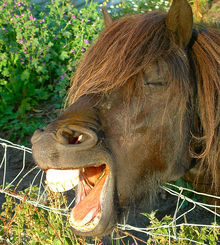According to the College of Veterinarians of British Columbia, people who are not veterinarians and who are not trained to care properly for horse's teeth and are unqualified and unlicensed are offering their services as "equine dentists."

Importance of proper horse dental care
"We also know that, just as in the field of human health care, preventative health care for horses is far more beneficial, both health-wise and economically, than reactive care that is provided only after an illness or problem arises.".
© 2013 by Rachel C
In a statement from the College, Dr. John Twidale, Equine Committee BCVMA. states, "There is no independent profession of animal or equine dentistry; there are certainly many veterinarians who provide excellent and comprehensive equine dental care, but they are not 'dentists'".
He goes on to state, "Over the past 15 years there has been a dramatic increase in veterinarians' and horse-owners' knowledge and understanding of the importance of equine dentistry. We know that horses that are housed and fed in a modern stabled environment have dramatically different chewing and dental wear issues that horses that evolved by surviving in the wild."
"We also know that the horse's dental health is an integral factor in other health issues. Thus, equine dentistry not only influences and affects the overall health of a horse, it also can play an important role in a horse's athletic performance."
"We also know that, just as in the field of human health care, preventative health care for horses is far more beneficial, both health-wise and economically, than reactive care that is provided only after an illness or problem arises."
"Gone are the days when horse's teeth are ignored until performance or eating problems become evident. We all know very well that with our own human teeth we would never wait for a major problem before visiting a dentist; and so it is with equine teeth and mouth problems."
"As preventative health care for the equine mouth is a very important part of health care for our horses, it needs to be addressed on a regular basis. Proper routine dental care can dramatically improve the quality of life and, as well, extend the life and career of our horses."
"Your equine veterinarian, who is already familiar with your horses, their health matters and their feeding and management, is best equipped to provide this care. It is customary for equine practices to keep computer records on file, which enables the practice to send out timely reminders in order to help you arrange for and provide preventative dentistry in advance of problems developing."
"The BCVMA wants horse owners to know that veterinarians are trained in all aspects of equine health care, and that most veterinarians who do any amount of horse work now have specialized training in equine dentistry. Proper and humane dental care often requires the use of intravenous sedation, analgesics and specialized equipment for dental diagnostics and treatment."
"Dental care of the horse is not limited to the teeth but includes examination of the oral cavity, head, sinuses, general health and nutrition. New equipment, techniques and better tranquillizing drugs enable veterinarians to provide better dental care in a manner less stressful to the horse."
According to Dr. Twidale, any non-veterinarian who has adopted the title of "equine dentist", regardless of what training they may claim to have, is not sanctioned, governed or trained by any statutory regulatory organization in British Columbia, Canada, or the USA.
Furthermore, the injection or administering of sedative drugs to another person's horse is a veterinary medical act, and any person who, without authorization under the Veterinarians Act, independently obtains or administers these drugs, is in violation of the law.
The BCVMA wants to remind the horse owners of B.C. that our members are available to you as a resource on all matters related to veterinary care, and the BCVMA encourages every horse owner to consult their veterinarian about equine dentistry. Veterinarians are an important part of the relationship between horse and owner, and practitioners with special interest and training in dentistry are available throughout the province.
Veterinarians, by nature of our profession, always have the best interest in your horse's total health and well-being as our primary concern. It is the goal of the BCVMA to ensure that all horse owners in B.C. receive the highest quality care for their horses.
-Dr. John Twidale, Equine Committee BCVMA
